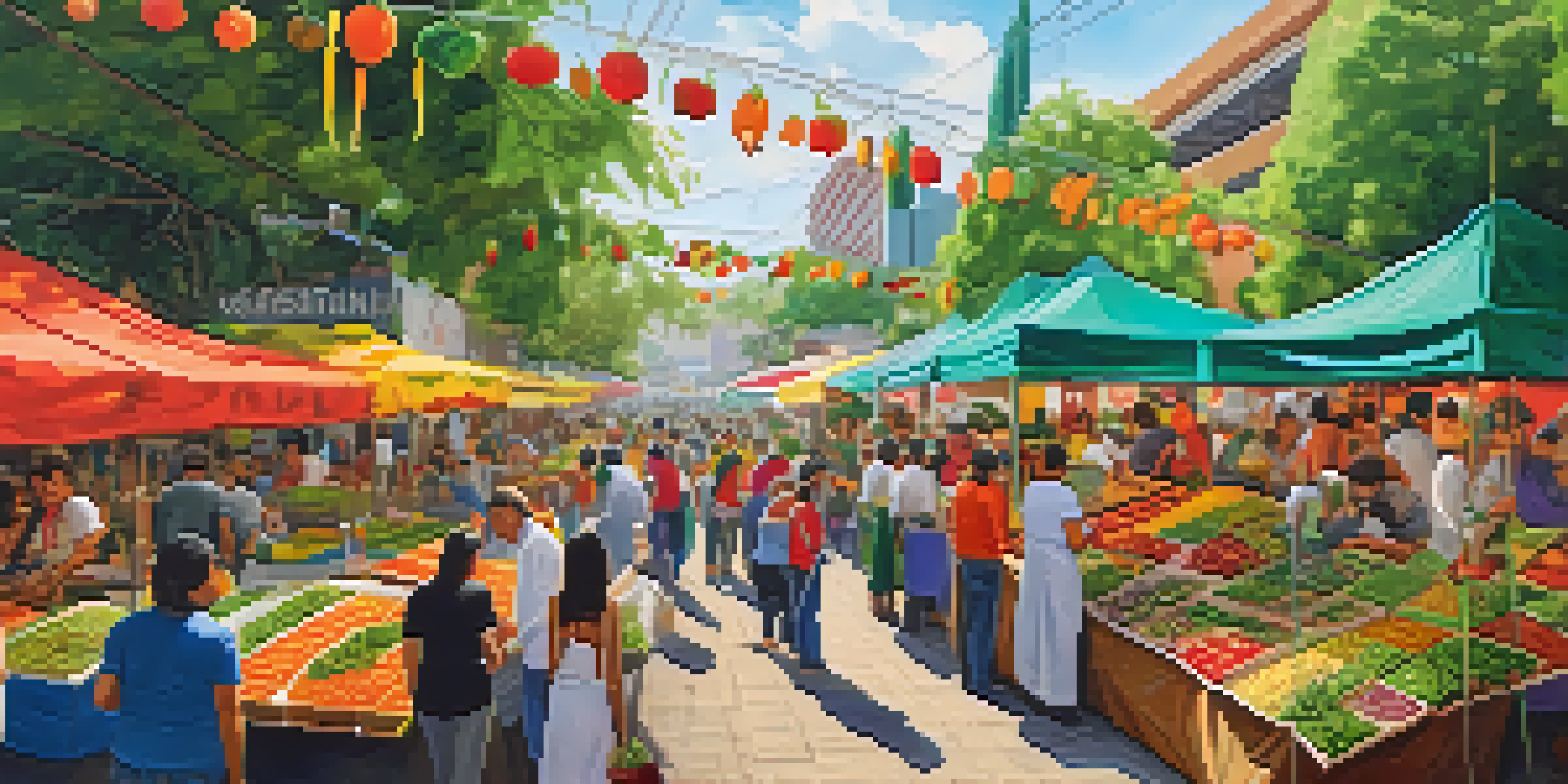Cultural Significance of Vegetarianism in Latin American Nations

Historical Roots of Vegetarianism in Latin America
Vegetarianism in Latin America has deep historical roots, often intertwined with indigenous practices and beliefs. Many indigenous cultures revered nature and viewed animals as sacred, leading to a plant-based diet that honored the earth. This respect for the environment and its resources laid the groundwork for vegetarian traditions in various communities across the continent.
You can’t just eat food. You have to talk about it too.
As colonial influences swept across Latin America, these indigenous practices were often overshadowed by European diets that emphasized meat. However, the resilience of local cultures allowed many to preserve their vegetarian customs, which are still evident today. This historical backdrop highlights how vegetarianism is not merely a dietary choice but a reflection of cultural identity and heritage.
In modern times, many Latin American countries are experiencing a resurgence in vegetarianism, driven by a desire to reconnect with these ancestral values. The movement emphasizes health, sustainability, and ethical considerations, making it relevant in a contemporary context. Thus, the historical significance of vegetarianism continues to shape its role in society today.
Cultural Practices and Vegetarian Festivals
In many Latin American nations, cultural practices surrounding vegetarianism are celebrated through various festivals and events. For instance, the 'Feria Vegetariana' in Mexico City showcases a wide array of plant-based foods, cooking demonstrations, and educational workshops. Such events not only promote vegetarianism but also foster a sense of community among like-minded individuals.

These festivals often highlight traditional dishes that have been adapted to fit a vegetarian lifestyle, showcasing the creativity and resourcefulness of local chefs and home cooks. Dishes like 'chiles en nogada' or 'tamales' can be made vegetarian, allowing participants to savor the flavors of their culture without compromising their dietary choices. Food becomes a bridge between past and present, connecting generations through shared culinary experiences.
Cultural Roots of Vegetarianism
Vegetarianism in Latin America is deeply rooted in indigenous practices that revere nature and animals, reflecting cultural identity.
Moreover, these gatherings serve as platforms for discussions about health, environmentalism, and animal rights, further embedding vegetarianism into the cultural fabric. As more people embrace plant-based diets, these festivals contribute to a growing movement that honors tradition while promoting a sustainable future.
Religious Influences on Vegetarian Practices
Religion plays a significant role in shaping vegetarian practices across Latin America, with various faiths promoting plant-based diets for spiritual and ethical reasons. For instance, some indigenous religions emphasize harmony with nature, advocating for a diet that minimizes harm to living beings. This spiritual connection fosters a profound respect for the environment and its inhabitants.
Eating is an agricultural act.
In addition, the influence of Buddhism and Hinduism, brought by immigrants, has introduced vegetarianism as a moral imperative in some communities. Temples and spiritual centers often serve vegetarian meals, demonstrating the integration of dietary choices with spiritual beliefs. This blending of cultures enriches the vegetarian landscape and provides individuals with diverse reasons to adopt plant-based diets.
As religious teachings continue to inspire many, the intersection of faith and food creates a unique cultural significance around vegetarianism in Latin America. This connection elevates vegetarianism from a personal choice to a communal practice steeped in shared values and beliefs.
Health Benefits and Modern Trends
The health benefits of vegetarianism have gained increasing attention in Latin America, with more individuals recognizing the positive impact of plant-based diets on well-being. Research shows that a vegetarian diet can lower the risk of chronic diseases, leading many to reconsider their dietary habits. This shift reflects a broader global trend towards healthier eating, with Latin American nations joining the movement.
Social media and influencers play a crucial role in promoting vegetarianism, making it trendy and accessible. Platforms like Instagram and TikTok are filled with vibrant vegetarian recipes and lifestyle tips that resonate with younger generations. This digital revolution is reshaping perceptions of vegetarianism, making it not just a diet but a lifestyle choice that aligns with modern values.
Health and Environmental Awareness
Increasing awareness of health benefits and environmental sustainability is driving the modern vegetarian movement across Latin America.
As awareness of health issues continues to rise, many Latin American countries are witnessing a surge in vegetarian restaurants and products, catering to the growing demand. This trend not only supports local economies but also promotes healthier eating habits among the population, reinforcing the cultural significance of vegetarianism in contemporary society.
Environmental Concerns and Sustainable Practices
Environmental sustainability is increasingly becoming a focal point for vegetarianism in Latin America, as communities grapple with the impact of climate change. The livestock industry is a significant contributor to greenhouse gas emissions, leading many to adopt vegetarian diets as a means of reducing their carbon footprint. This awareness is driving a new wave of activism centered on sustainable food practices.
Local organizations and initiatives are working to educate communities about the environmental benefits of vegetarianism. Workshops, campaigns, and community gardens are empowering individuals to make informed dietary choices that align with their values. By promoting plant-based eating, these efforts aim to foster a culture of sustainability that transcends dietary preferences.
As more people recognize the connection between food choices and environmental health, vegetarianism is evolving into a powerful movement for change. This cultural shift not only addresses immediate health concerns but also promotes long-term sustainability for future generations.
Challenges Facing Vegetarianism in Latin America
Despite the growing popularity of vegetarianism, numerous challenges persist in Latin America. Cultural traditions heavily centered around meat consumption can make it difficult for individuals to adopt a vegetarian lifestyle. Family gatherings and celebrations often feature meat as a central dish, creating social pressure for those wishing to abstain from animal products.
Access to affordable and diverse vegetarian options can also pose a significant barrier. In some regions, fresh produce may be scarce or expensive, making it challenging for individuals to maintain a balanced vegetarian diet. Additionally, misinformation about nutrition can deter people from exploring plant-based diets, as they may fear they won't receive adequate protein or nutrients.
Challenges to Adoption Persist
Despite its growing popularity, cultural traditions and access to affordable vegetarian options present significant challenges in adopting plant-based diets.
However, as more people advocate for vegetarianism and share their experiences, these challenges are gradually being addressed. Educational initiatives and community support can help bridge the gap, encouraging individuals to embrace vegetarianism without feeling isolated or overwhelmed.
The Future of Vegetarianism in Latin America
Looking ahead, the future of vegetarianism in Latin America appears promising, with a growing movement towards plant-based diets. As awareness continues to rise about health, environmental issues, and ethical considerations, more individuals are likely to explore vegetarian options. This shift could lead to a significant transformation in dietary habits and cultural practices across the region.
Innovative culinary approaches and the fusion of traditional and modern recipes are expected to further enhance the vegetarian landscape. Chefs and home cooks alike are experimenting with flavors, creating exciting vegetarian dishes that celebrate local ingredients. This culinary creativity not only preserves cultural heritage but also makes vegetarianism appealing to a broader audience.

As the dialogue around vegetarianism continues to evolve, it has the potential to reshape the culinary identity of Latin American nations. With an emphasis on sustainability, health, and cultural richness, vegetarianism may emerge as a defining aspect of the region's future, inviting everyone to partake in its vibrant tapestry.